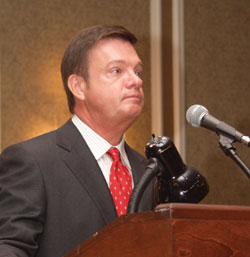President Howell sees veterinary profession in transition
In his July 12 address to the AVMA House of Delegates, Dr. Howell described a profession confronted by shifting demographics and public demand, economic and global pressures, and a need for heightened vigilance among veterinarians to defend the nation against biological attack. Moreover, Dr. Howell anticipates a younger profession dominated by women, with a growing number of foreign and foreign-trained veterinarians practicing in the United States. "We are in a unique, historic period in the veterinary profession," he said. "Never in the AVMA's 139-year history have so many changes been occurring in such a short period of time." Dr. Howell ran unopposed for AVMA president-elect and was elected by the HOD during the Annual Convention last year in Boston. In response to these changing demographics, Dr. Howell called for a study on the needs of women practitioners and for the creation of a program to mentor young veterinarians. He also encouraged the AVMA to exhibit greater sensitivity toward foreign and foreign-trained veterinarians. "As their professional association, we must evolve in our sensitivity to their particular needs or member services they will require because they will become us, just as surely as in the earlier years of our profession, women in our profession have now become us," he said. Relatedly, Dr. Howell drew attention to the fact that the AVMA leadership—predominantly older males—does not reflect the diversity of the Association's membership. This may be normal during transitional periods, he noted, when it takes time for a new generation of leaders to emerge. Concerning the ongoing debate between the AVMA and American Association of Veterinary State Boards over certification standards for foreign veterinary graduates, Dr. Howell urged veterinary state boards to carefully consider changes proposed by the AAVSB. Most states have adopted the AVMA Educational Commission for Foreign Veterinary Graduates program; the AAVSB is recommending an alternative model. The AVMA has attempted to work with the AAVSB on this matter, but without success, Dr. Howell noted. He promised strong opposition to any proposal that threatens to diminish veterinary education. "[W]e must be ready to expend whatever resources are necessary to stop this at the state level," he said. A review of the AVMA's governance rules and procedures, along with the respective roles of the Executive Board, House Advisory Committee, and House of Delegates, might be necessary. Although the present leadership model has served the AVMA well, Dr. Howell believes a formal assessment would help ensure that leaders are responsive to members' needs and are working efficiently. The companion animal practitioner reiterated his support for the National Commission on Veterinary Economic Issues and its work to enhance practice efficiency and veterinarians' income. By improving the income of practitioners and their staffs, the profession will guarantee its ability to continue delivering quality veterinary care, he said. Dr. Howell cautioned, however, that the public might react negatively to rising service costs, so veterinarians must take care that the public understands the high value of the care their pets are receiving. The profession must also fight off challenges from other groups portraying themselves as protectors of animals. The fact is, veterinarians are "the ultimate animal welfare people, and no other group has done as much to relieve animal suffering and pain or increase [animal] well-being as veterinarians," Dr. Howell said. Another factor influencing public perception is the shift in food animal medicine away from individual animal care toward herd or flock health care. The AVMA must develop food animal veterinarians with entrepreneurial skills. Dr. Howell promised to continue supporting efforts by the NCVEI and veterinary colleges to create educational models promoting this concept. Dr. Howell "vigorously" supports stronger alliances with foreign veterinary associations and accrediting bodies. In addition, he believes the AVMA should serve as a resource and as a model for countries seeking to improve veterinary standards. In light of the tragedy of Sept. 11 and the looming fear of a biological attack, Dr. Howell challenged veterinarians and the AVMA to ready themselves as resources to combat zoonotic diseases that could be used as weapons of terror. "I challenge us all to be better informed and fulfill our roles as needed," he said. "The AVMA must stay abreast of all these issues and be sure that funds are expended where they will do the most good, and that we as veterinarians are utilized properly in our country's war on terror." | ||
 AVMA President Joe M. Howell anticipates a younger veterinary profession dominated by women, with a growing number of foreign
AVMA President Joe M. Howell anticipates a younger veterinary profession dominated by women, with a growing number of foreign